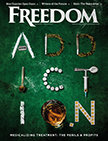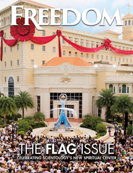The Relevance of Religion in 2015

Everywhere you look, it seems, signs of the decline in moral values are in evidence. It’s visible in a rampant narcissism, sense of entitlement and generalized contempt exercised by some factions of society. It’s recognized in the breakdown of the family structure. It’s acknowledged in the depersonalization wrought by social media that activates and reinforces both unchecked hubris and an utter absence of accountability.
One constant that we see in most every Western society whose morality has decayed from within is a rejection of spirituality and a concurrent decline in religious faith—a creeping secularism that even now washes over the United States in particular, like a flash flood over a parched landscape.
But is that merely a coincidence? Maybe. Then again, maybe not.
Religion is acknowledged as the glue that binds a culture—or series of smaller cultures—together. It’s the theological port in the storm, a place to remain grounded during times of crisis and strife. Its absence is thought to leave a nation adrift like a rudderless sailboat, like a backpacker who misplaced his compass and now aimlessly wanders.
And yet it’s become not only permissible to flagrantly mock religion in America today, but cool. From Bill Maher to Jon Stewart, South Park to Family Guy, irreverent impiety is all over television. They assure everyone from Catholics to Lutherans, Hindus to Muslims, Jews to Presbyterians, and Mormons to Scientologists that their system of belief is quite literally a joke.
If that doesn’t bother us just a little bit, perhaps it should.

I say this as someone who has not always been the most devout of human beings. In fact, at many points in my adult life, in part because of my calling as a skeptical journalist, nearly the opposite has been true. I have regularly questioned the existence of God, struggling to imagine what Supreme Being would see fit to wipe out 6 million Jews during the Holocaust, permit the rise of AIDS and Ebola, allow young children to waste away from cancer or be gunned down in a Connecticut classroom by a firearm-wielding madman.
This is, of course, to say nothing of the justifications of extremists who are able to validate the perpetration of stunning evil as a purposeful misinterpretation of their religious doctrine. I’m talking about terrorists who hijack and crash passenger jetliners into buildings in the name of striking back at so-called infidels (i.e., those who conduct their lives in ways they consider aberrant and disrespectful to their faith).
While the world rose up in condemnation of the Charlie Hebdo killings, with nearly 4 million people, including 40 world leaders, marching in solidarity across France in the week that followed—it served as a shocking reminder that the most radical factions can be driven to react with vengeance and hostility rather than temperance and diplomacy.
But it’s important to note that those extremists who perpetrate such horrific crimes are criminals, not noble martyrs, hiding behind an Islamic cover. Their rogue behavior finds no justification in the Koran, as Muslim leaders assure. In some instances, terrorists on suicide missions were programmed using psychiatric techniques and while under the influence of drugs—another purposeful misinterpretation of Koranic law.

Senseless, seemingly random acts of violence and horror are too often a divisive byproduct of those seeking to punish enemies whose spiritual beliefs differ from their own—such as suicide bombers who hide beneath the veil of pious virtue. This is religious dogma at its very worst: To validate the most zealous demonstrations of man’s inhumanity to man. I refer to this as “My God is better than your God” thinking.
Even though the influence of religion is purported to be in decline, as Pew Research Center study after study assures us is the case, it isn’t in fact a rejection of spirituality but rather a rejection of the use of religion to justify such things as war and division.
Today, religion is often pushed to the wayside because, ridiculous though it may seem, it’s being forced to contend with too many distractions in our attention-scattered culture. It gets lumped in with web surfing, television watching, video games, movies, cellphones, Facebook, Twitter and an ever-expanding array of things competing for our eyes, ears and thoughts.
There is certainly also an argument to be made that science and scientific influence are given too little relevance in the modern world when compared with religion. But this is another area in which an either/or mentality blocks reason. Science and spirituality can easily coexist without one canceling out the other. The perception of a life philosophy that’s more literal and tactile, trumping another that’s decidedly more transcendent and divine, is perplexing on its face.
Those who choose to denounce religion as antiquated or lacking in clear logic are of course entirely missing the point. That it may require literal and figurative leaps of faith doesn’t point to irrelevance but instead shows a diversity of belief—a healthy sign in any democracy.

So where do critics get off in dismissing something as being nonexistent because they personally cannot see it, hear it, touch it or otherwise understand it?
If your faith is real to you, then it’s as genuine as it needs to be—period. And as long as no one is harmed or repressed or otherwise coerced in the practice of that belief—and if it brings spiritual comfort and guidance to those who abide it—it is no one’s business but that of the congregants and followers.
It is for this reason that we shouldn’t take too seriously the exaggerated reports of religion’s precipitous waning. Religion remains, and always will remain, relevant to the lives of a majority of the population for a number of salient reasons.
Most prominent is the simplest of motives: People want religion, faith and spiritual values. And those who want these find it unthinkable they could ever get along without them.
Just as water seeks its own level, we seek a counterbalance in our lives that brings deeper meaning to existence beyond the routine act of surviving from day to day. We require on an almost primal level to believe in something greater than ourselves that creates in our mind a sense of mission. Religion, when permitted to propagate and thrive, provides that transcendent significance that at the same time serves as a unifying, beneficial force for good.
Those who are engaged in the pursuit of enlightenment, and of a higher purpose, consistently spread positive energy by the very nature of that ongoing quest. Not to get too metaphysical about it, but when we are immersed in the process of self-improvement and meaningful understanding, we are pretty much incapable of creating destructive momentum in the lives of ourselves or those around us.
That’s really where those who engage in unrestrained bashing of religion get it so wrong. The overwhelming majority of those who practice their chosen faith act in ways that bring out their best attributes and that meaningfully elevates the dialogue.

In nearly every instance, the goals of religion, aside from instilling senses of belonging and well-being, are to give back, to make a difference, to help those in need in word and deed, to pay it forward. And religions often meet and even exceed that objective.
Religion is at its best a civilizing force that—when properly practiced—makes the world a far better place and mankind a profoundly more evolved species. We are never more human, or more alive, than when we are engaged in the process of practicing selfless acts of altruism and kindness, and religious faith supplies the organizational vigor that helps such acts to thrive.
To put it bluntly, however, religion has gotten a bum rap of late. It’s been dismissed as the problem rather than a key part of the solution.
It is hardly a coincidence that the battering of so many of our freedoms in this country has corresponded with attacks on religious sovereignty. Privacy is under assault, along with free speech. With attacks on religions on the rise, it’s beginning to induce people of faith not to communicate with one another and to reject those of different beliefs.
Yes, this is what leads to paranoia and people of a single faith becoming insular. But any hostility from the outside will not cause those who practice to abandon their conviction; in fact, it’s likely the opposite is true. And asking if religion is relevant to them is like asking if it’s important to breathe.
As history has shown, oppression and persecution of one should be viewed as oppression and persecution of all.
The good news is that those who look to demean and ridicule religion in general—and any specific one in particular—are strengthening the resolve of the believers. The trend toward secular arguments against the primacy and validity of faith is precisely that: a trend. As such, it will reverse, likely sooner rather than later.
Not that religion itself is susceptible to the wild vagaries of trends, of course. It isn’t a faucet you can turn on and off. It’s not a bus you can hop on and off. It’s a choice but it’s also an identity, an ideology, a way of looking at the world and at ourselves that doesn’t change with the positions of the planets. Its ideals and beliefs are passed on through generations.
What never changes is the essential human quality of spiritual longing and the need for spiritual belonging. For that and many other reasons, the relevance of religion remains incontrovertible.

Make no mistake, nothing stays the same for very long. Slaves were kept as property in the United States until a mere 150 years ago. American workers labored in terrible conditions for low wages and without a safety net as recently as a century ago. Segregation was inextricably woven into this nation’s fabric 50 years ago. Nothing can halt the march of change—much of it fortunately for the better.
What never changes is the essential human quality of spiritual longing and the need for spiritual belonging. For that and many other reasons, the relevance of religion remains incontrovertible.
It might help, however, if we stopped messing with it.





























